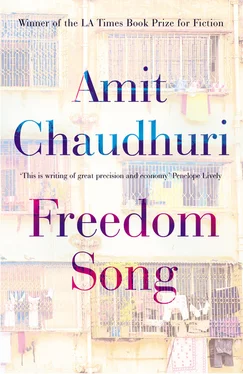‘You haven’t called Minidi and Shantidi yet,’ said Bhaskar’s mother.
Bhola looked up.
‘I will of course,’ he said, and admitted to himself that he’d forgotten. How could one possibly remember everyone? And this was a time that memory played tricks with you.
Since moving to Calcutta, they had seen each other every year except this one. For Mini and Shantidi used to come religiously by bus once or twice a year to Bhola’s house with a pot of sweets from the North in their hands, their exultation far exceeding the occasion; and this was before the roads became bad and when they themselves were untroubled physically; before their brother had moved and they became overwhelmed by the weight and pressure of their sheer everyday existence. On those visits, they had seen Bhola struggle with his business; seen Bhaskar growing up and Piyu cram for her exams; seen Bhola’s mother as an old and absent woman, and then heard of her death; seen Manik go abroad; been present, in other words, in the semi-lit, casual backstage and dress rehearsals, the unconscious, helpless putting on and putting off of different selves and incarnations, of their lives.
It was afternoon. And in a small lane, in front of a pavement, with the movement of a wrist, something like a curve began to appear, it was not clear what pattern was forming, then the letter D appeared upon the wall of a two-storey house, in black paint, and then U, and N, until DUNKEL had been formed, in the English language, which seemed to blazon itself for its curious purpose; then it began again, and I and M and F began to appear in another corner. Afternoon; no one saw them; it was too hot; on the main road cars went past, up and down; a few people rested; they had eaten; beggars dozed, blind to the heat and shadows, their heads bent to their stomachs. Others on the pavement on the main road, who lived near shop windows or facing tramlines, were still finishing their meals on their plates. Now a picture was forming that would multiply, like an ornate decoration, in different parts of the city, a decoration mirrored, yet seen by almost no one, glanced at perhaps as other thoughts occupied one’s head, background to people waiting for buses; yet it told a story. GATT had been ratified of course; the whole matter had been done with and it had left a wound; yet they went on with these slogans as if they knew something might still come of it. Gradually, on the perfectly good whitewashed wall, there appeared a tiger with the finance minister’s turbaned head, a man in coat-tails, a hat that had stars and stripes drawn on it, with a hoop in one hand. The minister, who was, after all, three-quarters tiger, seemed to be polite and full of pleasant intentions but compromised by some invisible fact; he hesitated a moment before he leapt. All else, the figures in the background, the man in the coat-tails, waited; the music had stopped. Only a crow, unseeing, inadvertent, unmindful of human beings, hopped on the pavement again and again, as the spectacle, frozen, unfolded; it appeared to be both searching for, and avoiding, something. Silence echoed all around; even the crow neglected to caw; what would the next action be? Again and again the human-headed tiger seemed to be about to jump but did not. Nikhil, standing and watching, wanted a cup of tea.
When Mini woke up, she reached out for her spectacles. For without them she suffered a temporary darkening of vision.
And then she saw her sister. There was Shantidi, already awake, wandering about on the balcony.
Although Shantidi was better now, and her mild fracture had healed, she had changed to a new, intractable sort of introspection and stubbornness. She would not leave the house.
‘What’s the matter,’ asked Mini finally, ‘isn’t it tiresome for you to stay here all day? Why don’t you start going out a little?’
Shantidi laughed. She shook her head.
‘There are things you don’t know,’ she said. ‘There’s a reason I don’t go out.’
‘And what is the reason?’ asked Mini.
‘You are too trusting, Mini. There are people with their eye on the flat.’
‘On our flat?’ asked Mini, incredulous but nevertheless agitated, her heart beating, with a logic of its own, a little faster. (For over the last two months she’d understood that they could just barely make do on about three thousand rupees a month, but fell short if there were emergencies or accidents. And for the first time the idea came to her of them living in an old age home and that it might be the best future they’d have.)
Shantidi shook her head solemnly. Outside, there was the high-pitched call of a bird that seemed unused to these surroundings.
‘Not only our flat — any flat! If the corporation thinks any flat has been left empty, they will take it over and sell it. And there are people over here in the building who are ready to buy another flat to add to their own property. You know that families keep growing,’ she gestured around her. ‘Besides, there are people living here who have connections with the corporation — what if they go and tell someone?’ She spoke with great, knowledgeable practicality, as she always had.
For many years they’d had no one but each other, and sometimes when they spoke they just became two voices, speaking to each other for the sake of speaking, and when they were silent their surroundings became audible.
And Mini wondered where she’d got all her information — she who had almost broken her leg and had not stirred out of her home for more than a month. She’s beginning to have delusions now, sitting here with almost nothing to do, she thought; this is a new development, she concluded interestedly.
‘Who told you?’ she asked.
‘I’ve heard—’ Then, as if to redeem this generality and strengthen her case, she said, ‘Mrs Roy told me as well.’ And suddenly she looked alone.
There was something in Mini’s presence, even as she stood there, small and silent, that imparted peace. It emanated and touched those who were around her.
‘But you can go out for a few hours. No one will take possession of the flat if you’re away for a short while.’
‘Oh no no! You can’t say!’ said Shantidi. ‘These corporation people are capable of anything! And they keep track! They might knock on the door when both of us are away, and say, “Write it down, this flat is empty.”’
There was a by-lane off Central Avenue, on the corner of which there was a shop that dealt in osteopathic aids and implements, part of it facing the main road. Some of these implements were curved and bent fluently, so that they looked like limbs themselves, on the verge of moving, except that they were sturdy and shone, metallic. It was strange the way you might not have seen the shop for years and then one fine day you noticed it. But when someone at school mentioned it to Mini she already knew the place. She thought she might look in and consider buying a special stick of some sort. For actually the pain, which had disappeared almost, was gradually coming back.
And now Bhaskar wore his white bridegroom’s topor; and Bhola first wore his own dhoti and then tied one around his son. But Bhaskar’s heart fluttered in secret as if he was nervous before a performance even as outwardly he managed to appear uniformly either bored or harried; and he had the merest premonition of coming happiness, so natural a state that he would already be unable to remember any other that had preceded it.
All that month Piyu, at her study table, had read for her tests beneath the light of the table lamp.
The frightening and exhilarated sound of ululation rose over the other sounds in Vidyasagar Road; it disturbed some of the children rapt in their textbooks in the other houses. A wedding was not unusual in the evening though it might be unexpected at that time of year. And it reminded one of other things which the city usually kept secret. People on balconies watched as a car came to pick up Bhaskar; darkness had settled on almost everything; a small group of relatives formed temporarily outside the gates of the house, deterring passers-by. They were patiently waiting for Bhaskar; he’d gone to the toilet; they noted that it was twenty-five minutes to the auspicious moment, the lagna, and hoped he wouldn’t be long. . but here he was! Then they got into the car; Bhola, his heart in his mouth, and other relatives would follow in their cars through Vidyasagar Road and Ashutosh Mukherjee Road.
Читать дальше












